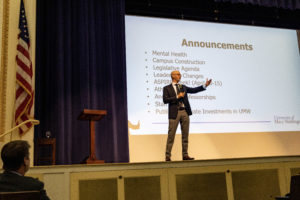There’s much to be optimistic about as the spring 2023 semester begins, President Troy D. Paino told attendees of the All UMW Faculty and Staff Assembly on Wednesday, Jan. 18.
By sticking to its strategic vision, Mary Washington is navigating higher education challenges that have beset collegiate institutions since the start of the pandemic, Paino said in his semiannual state of the University address.

“We have to be a mission-driven institution,” he said. “We have to know why we exist, and we have to be to be true to that purpose.”
That commitment has fostered a positive campus climate as UMW prepares for an on-site reaffirmation visit in March from the Southern Association of Colleges and Schools Commission on Colleges (SACSCOC), the accrediting body for degree-granting higher education institutions in the Southern states.
A key part of the process is a new Quality Enhancement Plan (QEP) with a focus on Life After Mary Washington. The goal is to immerse students in a culture that helps them understand the core competencies necessary to lead meaningful lives and have productive careers.
In recent years UMW has played to its strengths as a smaller public liberal arts and sciences institution keenly focused on providing a high-quality undergraduate experience, Paino said. Rather than trying to maximize growth and emulate Virginia’s many larger institutions, UMW aims for a student body of about 3,500, with mostly residential students.
It’s a positive sign, the president said, that applications from high school seniors are on track. UMW isn’t merely chasing numbers of applications, he emphasized, but aiming for applications from students who have a sincere interest in attending Mary Washington and who can be successful here. Another healthy indicator: Even as many institutions shed startling numbers of upperclass students during and after pandemic shutdowns, UMW increased its retention rate to just shy of its 85% goal.
Still, Mary Washington isn’t ignoring challenges predicted for all sizes and types of higher education institutions in coming years. From the demographic cliff and change in college-age and college-bound populations to addressing the value of higher education, UMW remains committed to understanding the needs of college students and their families, and serving our community.
Paino lauded the upcoming ASPIRE week, a student-driven effort April 10 to 15 to celebrate the University’s values of accountability; scholarship; personal and institutional integrity; inclusive excellence; respect and civility; and engagement.
He spoke of Mary Washington teams’ athletic achievements, of major upcoming investments in a new theatre building and a renovated arts complex, of enhanced efforts to reward faculty and staff excellence, and of recent fundraising and private donation successes he termed record-breaking, with more to come.
The combination of public and private support for UMW should encourage faculty, staff, students and others in the campus community. “There are people out there who are recognizing the important and amazing work you do each day,” Paino said, “and are investing in it.”